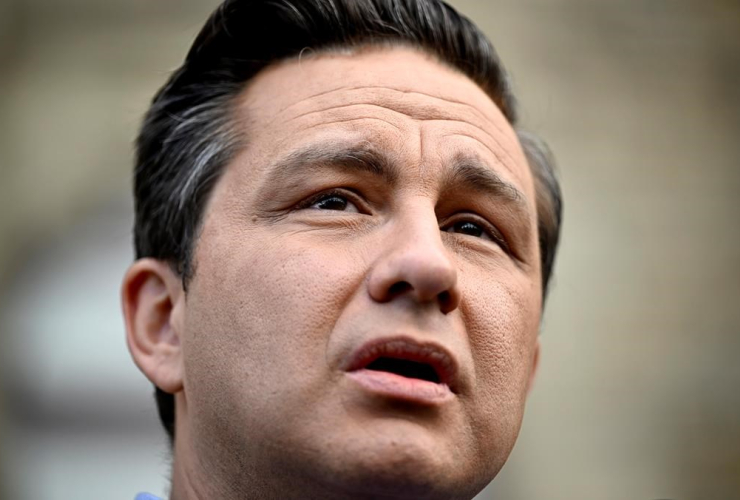Ever wondered if Poilievre is truly bilingual? Well, buckle up, because we're diving deep into this hot topic. In today’s globalized world, being bilingual isn’t just a cool skill—it’s practically a necessity. For politicians like Poilievre, language proficiency can make or break their career. So, is Poilievre bilingual? Let’s find out together.
When it comes to Canadian politics, language plays a crucial role. Canada is officially bilingual, recognizing both English and French as its national languages. This means that politicians, especially those on the federal level, are expected to communicate effectively in both languages. Enter Pierre Poilievre, a prominent figure in Canadian politics who has sparked debates about his bilingual abilities. We’re here to uncover the truth.
This isn’t just about Poilievre—it’s about understanding the importance of bilingualism in leadership roles. Whether you’re a die-hard fan or a curious observer, this article will give you the lowdown on Poilievre’s linguistic skills and why they matter. So, grab your favorite drink, and let’s dive in!
Read also:Caitlin Clark Leaked The Truth Behind The Controversy And What You Need To Know
Table of Contents
- Poilievre’s Biography
- Why Bilingualism Matters in Politics
- Poilievre’s French Skills
- Public Reaction to Poilievre’s Bilingualism
- What Experts Say
- The Numbers Speak Louder
- Controversies Surrounding Poilievre’s Bilingualism
- The Impact on His Career
- How Poilievre Stacks Up Against Other Politicians
- What’s Next for Poilievre?
Poilievre’s Biography
Pierre Poilievre is more than just a name in Canadian politics. Born on April 29, 1979, in Ottawa, Ontario, he has carved out a reputation as a fiery and outspoken politician. Poilievre’s career began at a young age, and he’s been making waves ever since. But before we dive into his linguistic abilities, let’s get to know the man behind the controversy.
Key Facts About Poilievre
Here’s a quick rundown of Poilievre’s life and career:
| Full Name | Pierre Poilievre |
|---|---|
| Birthdate | April 29, 1979 |
| Place of Birth | Ottawa, Ontario |
| Political Affiliation | Conservative Party of Canada |
| Position | Member of Parliament for Carleton |
Now that we’ve got the basics down, let’s move on to the juicy part—his bilingualism.
Why Bilingualism Matters in Politics
Being bilingual isn’t just a nice-to-have skill for politicians; it’s essential. In a country as diverse as Canada, where English and French hold equal status, speaking both languages is more than just a formality—it’s a necessity. Here’s why:
- Connects with a Wider Audience: Politicians who can speak both English and French can reach out to more voters, especially in provinces like Quebec.
- Strengthens National Unity: Bilingualism promotes inclusivity and unity, breaking down language barriers.
- Enhances Global Competitiveness: In an increasingly interconnected world, being multilingual gives politicians an edge on the global stage.
For Poilievre, mastering both languages could be the key to expanding his influence and appeal. But does he measure up?
Poilievre’s French Skills
When it comes to Poilievre’s French, opinions are divided. Some say he’s got a decent grasp of the language, while others claim he’s not fluent enough. So, where does the truth lie?
Read also:Chris Brown Height And Weight The Ultimate Guide To His Stats And More
His Journey with French
Poilievre’s exposure to French started early. Growing up in Ottawa, a predominantly bilingual city, he had access to French immersion programs. However, mastering a language is no easy feat, and his proficiency has been a topic of debate.
Let’s break it down:
- Strengths: Poilievre can hold basic conversations in French and understands key phrases.
- Weaknesses: His vocabulary and grammar are sometimes criticized as lacking.
While he may not be fluent, Poilievre’s efforts to improve his French are commendable. After all, learning a new language is a lifelong journey.
Public Reaction to Poilievre’s Bilingualism
Public opinion on Poilievre’s bilingualism is as diverse as the Canadian population itself. Some people applaud his efforts to learn French, while others remain skeptical. Social media has been a hotbed of discussion, with tweets and posts flying back and forth.
Here’s what the public is saying:
- Supporters: Many Canadians appreciate Poilievre’s attempts to bridge the language gap.
- Critics: Others argue that he needs to step up his game if he wants to represent all Canadians.
Regardless of where you stand, it’s clear that Poilievre’s bilingualism—or lack thereof—has sparked a national conversation.
What Experts Say
Language experts have weighed in on Poilievre’s bilingualism, offering insights into his strengths and weaknesses. According to linguists, mastering a second language involves more than just memorizing vocabulary—it’s about understanding cultural nuances and context.
Dr. Marie-Claire Lambert, a professor of linguistics at the University of Ottawa, explains: “Bilingualism isn’t a binary state. There are varying degrees of proficiency, and Poilievre falls somewhere in the middle.”
This nuanced perspective highlights the complexity of evaluating someone’s language skills. It’s not just about whether Poilievre is bilingual—it’s about how effectively he can communicate in both languages.
The Numbers Speak Louder
Data can often shed light on complex issues, and bilingualism is no exception. Statistics from Statistics Canada reveal that approximately 17.9% of Canadians are bilingual, speaking both English and French. This figure underscores the importance of bilingualism in Canadian politics.
Here are some key stats:
- Quebec: Over 40% of Quebecers are bilingual, making French proficiency crucial for politicians seeking votes in the province.
- Ontario: While Ontario’s bilingual population is smaller, it’s still significant, with around 10% of residents speaking both languages.
These numbers highlight the pressure on politicians like Poilievre to improve their language skills.
Controversies Surrounding Poilievre’s Bilingualism
No discussion about Poilievre’s bilingualism would be complete without addressing the controversies. Critics have accused him of not putting enough effort into learning French, while supporters defend his progress.
Key Controversies
Here are some of the most talked-about issues:
- Public Speaking: Poilievre’s French speeches have been scrutinized, with some viewers pointing out grammatical errors.
- Media Interviews: His interviews in French have sparked debate, with opinions ranging from praise to criticism.
Despite the controversies, Poilievre continues to push forward, determined to improve his skills.
The Impact on His Career
Poilievre’s bilingualism—or perceived lack thereof—has had a significant impact on his career. In a country where language is a sensitive issue, his proficiency in French could either boost or hinder his political ambitions.
Here’s how it affects his career:
- Opportunities: Improved French skills could open doors to new constituencies and alliances.
- Challenges: Lingering doubts about his fluency might alienate some voters, especially in Quebec.
As Poilievre navigates these challenges, one thing is certain: his journey with bilingualism will continue to shape his political future.
How Poilievre Stacks Up Against Other Politicians
When compared to other Canadian politicians, how does Poilievre fare in terms of bilingualism? While some leaders, like Justin Trudeau, are fluent in both languages, others struggle with varying degrees of proficiency.
Here’s a quick comparison:
- Justin Trudeau: Fluent in both English and French, Trudeau sets a high standard for bilingualism.
- Poilievre: While not as fluent as Trudeau, Poilievre’s efforts to improve are acknowledged by many.
This comparison highlights the varying levels of bilingualism among Canadian politicians and the importance of striving for improvement.
What’s Next for Poilievre?
Looking ahead, Poilievre’s journey with bilingualism is far from over. With increasing pressure to improve his French, he has plenty of opportunities to grow and develop his skills. Whether through formal education or immersive experiences, Poilievre has the potential to become a more proficient bilingual leader.
As he continues to navigate the complexities of Canadian politics, one thing is clear: bilingualism will remain a key factor in his success.
Conclusion
In conclusion, the question “Is Poilievre bilingual?” doesn’t have a simple yes or no answer. While he may not be fully fluent, his efforts to improve his French are commendable. In a country as diverse as Canada, bilingualism is more than just a skill—it’s a bridge to unity and understanding.
So, what’s next? Whether you’re a fan or a critic, one thing is certain: Poilievre’s journey with bilingualism will continue to evolve. We encourage you to share your thoughts in the comments below or explore more articles on our site. Together, let’s keep the conversation going!



